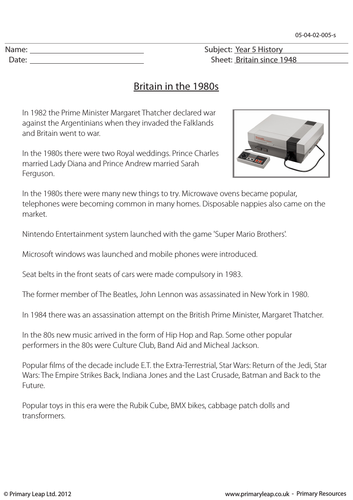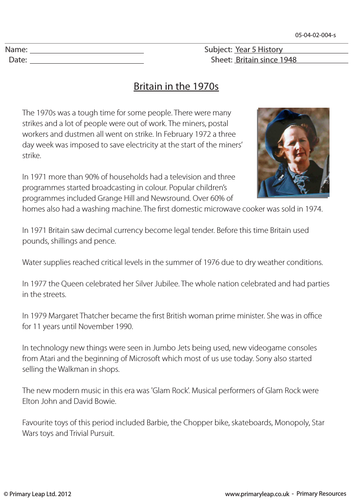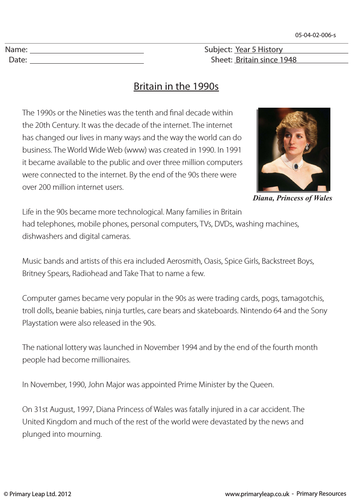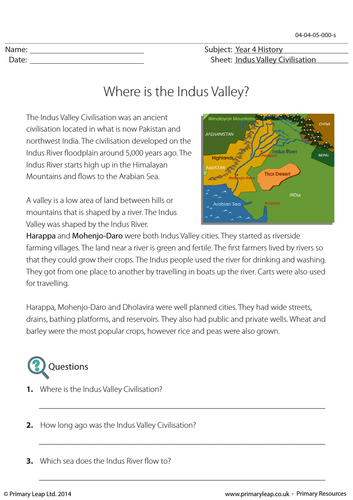512Uploads
453k+Views
210k+Downloads
History

KS2 History Resource - Britain in the 1980s
KS2 History Resource - Britain since 1948. This worksheet includes some interesting facts and events in the 1980s. Students read the text and answer the study questions.
This worksheet was created by Primary Leap

History Resource - Cloze Activity: Remembrance Day Facts
This worksheet was created by Primary Leap
When is Remembrance Day held? Who wrote the poem ‘In Flanders Fields’? This history resource asks students to read the facts about Remembrance Day and fill in the missing words. There is a word bank to help them.
Additional worksheets, lesson plans, and interactive activities are available on Primary Leap.

KS2 History Resource - Britain in the 1970s
This worksheet was created by primaryleap.co.uk
KS2 History Resource - Britain since 1948. This worksheet includes some interesting facts and events in the 1970s. Students read the text and answer the study questions.

KS2 History Resource: Britain in the 1990s
KS2 History Resource - Britain since 1948. This worksheet includes some interesting facts and events in the 1990s. Students read the text and answer the study questions.
This worksheet was created by Primary Leap

Reading Comprehension - Where is the Indus Valley?
This reading comprehension includes interesting facts about the Indus Valley Civilisation. Students read through the text and then answer the questions.
This worksheet was created by Primary Leap

KS1 The Titanic Reading Comprehension
The Titanic Reading Comprehension Activity
This worksheet is crafted to introduce young learners to the fascinating story of the Titanic while incorporating interactive elements that promote comprehension and critical thinking. The worksheet highlights the importance of studying historical events like the Titanic. It encourages students to delve into the past, make connections to the present, and glean valuable lessons for the future. To assess comprehension and critical thinking, the worksheet includes multiple-choice questions. These questions are designed to test students’ understanding of key facts from the passage. Incorporating the Titanic worksheet into your curriculum offers a unique opportunity to introduce young learners to historical events and concepts in an engaging and age-appropriate manner.
This worksheet was created by Primary Leap

Word Search Activity - Rosa Parks
Students try and find the words relating to Rosa Parks hidden in the word search grid as part of their studies on this inspirational woman. This worksheet was created by Lauren Savage @ Primary Leap

History Resource - Remembrance Day Crossword
Students are asked to complete the Remembrance Day crossword.

History Resource - Word Search: Remembrance Day
This worksheet was created by Primary Leap
All of the words are associated with Remembrance Day. Students are asked to find the words hidden in the grid. There are 15 words to find.

Cloze Activity - Indus Valley
This worksheet was created by Lauren Savage @ Primary Leap
Children read the facts about the Indus Valley and fill in the missing words from the word bank.

KS2 Biography Resource - Muhammad Ali
Where was Muhammad Ali born? Before he changed his name, what was he known as? When did he retire? Students are asked to use resources like the internet, library books, or magazines to fill in this report form about Muhammad Ali. This worksheet was created by primaryleap.co.uk

History Resource: Britain in the 1950s
Year 5 History - Britain since 1948. This worksheet includes some interesting facts and events in the 1950s. Students read the text and answer the study questions.
This history resource was created by Primary Leap

KS1 Rosa Parks Reading Comprehension
**Rosa Parks reading comprehension activity
**
This short comprehension is tailored for KS1 pupils and aims to introduce them to the inspiring story of Rosa Parks. The multiple-choice questions help children engage with the text, practise their reading skills, and think critically about the important message of courage and equality.
This worksheet was created by Primary Leap **

History Resource - Word Unscramble: Remembrance Day
This worksheet was created by Primary Leap
All of these words are associated with Remembrance Day. Students are asked to unscramble the letters and write the words correctly on the lines.
Additional worksheets, lesson plans, and interactive activities are available on Primary Leap.

The Titanic Word Search
The Titanic Word Search Activity
This handy word search activity is designed for KS1 pupils to have fun while learning about the famous ship, Titanic. In this word search, you will find hidden words related to the Titanic’s journey and the tragic event that took place in the Atlantic Ocean. As they search for words like “ship,” “ocean,” and “iceberg,” children will enhance their vocabulary and improve their spelling skills. Encourage your pupils to work independently or with friends to find all the words and learn more about the historical significance of the Titanic.
This word search was created by Primary Leap

History Resource - Alphabetical Order: Remembrance Day
This worksheet was created by Primary Leap
This year 6 history worksheet includes 15 words associated with Remembrance Day. Students are asked to put them in alphabetical order.

Reading Comprehension - Abraham Lincoln
This worksheet was created by Lauren Savage @ Primary Leap
Students can read about the life of Abraham Lincoln in this reading comprehension with accompanying study questions to answer. Abraham Lincoln was the 16th President of the United States of America, serving from March 1861 through April 1865, until he was assassinated.

History Resource - Who Do We Remember On Remembrance Day?
We celebrate Remembrance Day on the 11th November. We remember the sacrifices of members of the armed forces and civilians in times of war, especially since the First World War. Students read through the passage and then answer the accompanying study questions.

History Resource - What Happens On Remembrance Day?
At 11am on the 11th November, 1918, the guns of the Western Front fell silent after more than four years continuous warfare. What/who are we remembering on Remembrance Day? In what year was the first Armistice Day held? Students read through the text and answer the accompanying study questions.

History Resource - Why Do We Have Remembrance Day?
This worksheet was created by Primary Leap
Why do you think a two minutes silence is held on Remembrance Day? What was Remembrance Day formerly known as? Students read through the text and answer the accompanying study questions.




















